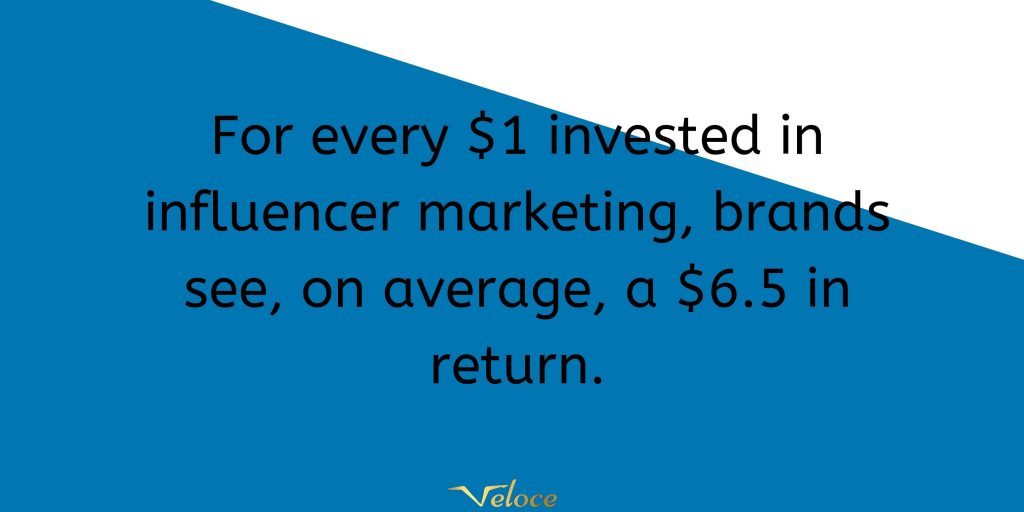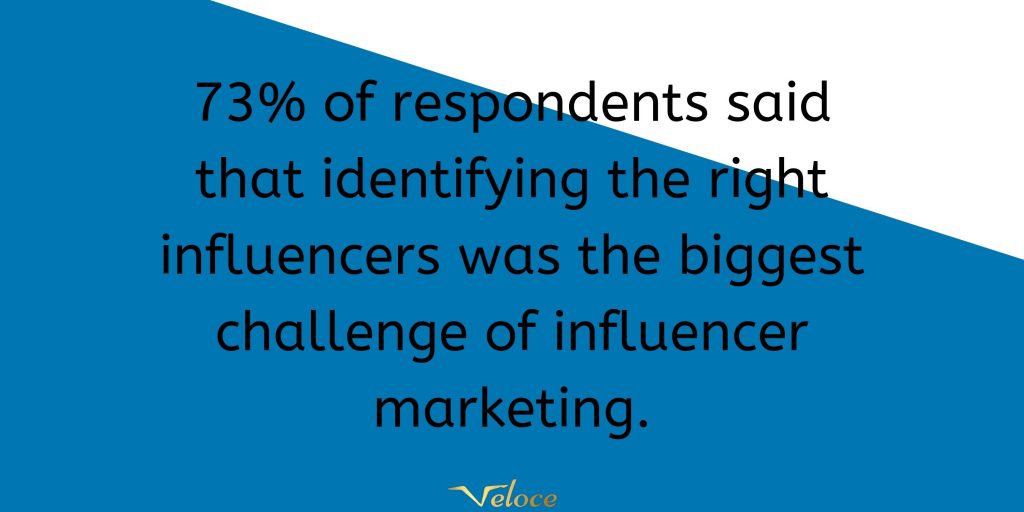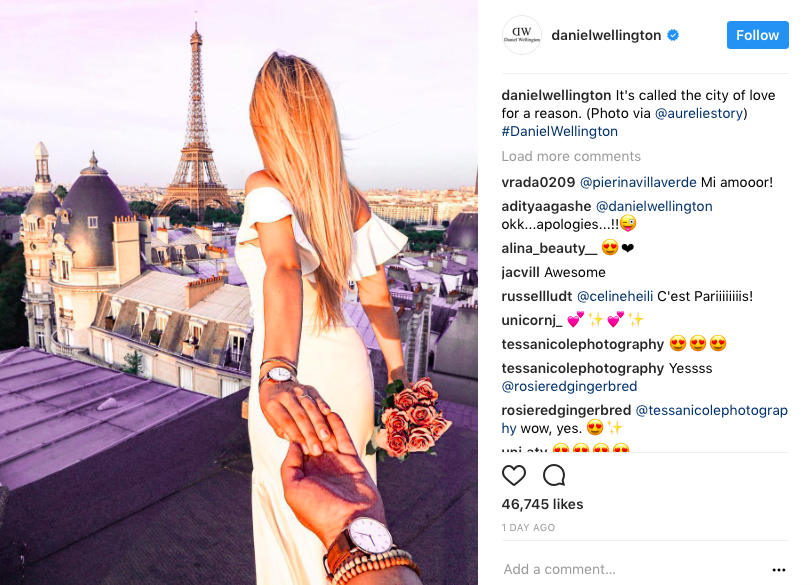Influencers are trusted individuals whose followers look up to them and turn to them for advice.
They have the ability to create content that is relevant and engaging to their audience, and can implement products in their social media posts that spark interest, and inspire them in a way that actually generates sales.
Influencers have huge convincing power because they are considered to be industry experts and authorities within their industries. As a result, their followers are expecting advice from them and trust their recommendations. Therefore, brands who partner with influencers and doe it well can generate incredible marketing results which few marketing methods can compete with.
In fact, for every $1 invested in influencer marketing, brands see, on average, a $6.5 in return. That’s quite powerful, don’t you agree?

At the same time that influencer marketing is a tremendously powerful marketing tool, it also comes with its sets of challenges that greatly affect how well your campaign performs.
You can’t jump into an influencer partnership without any knowledge on how to do it and wonder why you aren’t getting anywhere near the statistic mentioned above. To generate great results, and reach your true potential with influencer marketing, you first need to know how to properly set up a successful campaign, and then, most importantly, identify the biggest influencer marketing challenges, and overcome them before they do any damage.
In this article, we’re looking at 3 Huge Influencer Marketing Challenges And How To Overcome Them. By being aware of these influencer marketing challenges, you can be more prepared for when you’re going to launch your campaigns, and avoid stepping into the most common (and frustrating) pitfalls.
Finding the right influencers
If you’re experienced within the influencer marketing space, I am sure that this isn’t the first time you’ve read or heard about the huge challenge of finding influencers.
And it’s not surprising when the statistics speak very clearly: according to a study by Econsultancy, 73% of respondents said that identifying the right influencers was the biggest challenge of influencer marketing.
At the same time, I want to point out that the challenge is not finding influencers. Simply go to social media and you’ll find hundreds of them. The challenge is finding influencers that are relevant to, and suitable for your brand, which helps generate the best possible results.

I’ve said it many times before, but I’ll say it again:
“The influencer you partner with will have the biggest impact on your campaign’s success, but you cannot neglect the importance of the other elements that go into a successful influencer campaign just because you have found a good influencer”
What I mean by this is that the influencer will have the biggest impact on how well your campaign performs. If you partner with an influencer who has faked their whole influence by buying fake followers, you will never generate any results – no matter if you have done all of the other parts that go into a successful influencer marketing campaign.
This also means that just because you have found a perfect influencer in terms of engagement, impact, followers, and influence, you shouldn’t ignore all the other elements. The best results are generated when the influencer and the other aspects of a successful influencer campaign work together in harmony.
This means putting great effort into developing a strategy, finding a perfect influencer that aligns with your brand’s values and that has an engaged audience, while also making sure the message the influencer mediates comes off as genuine and engaging.
Finding influencers is difficult, there is no denying, however, it doesn’t have to be.
First off, you need to define your goals with your influencer campaign. When looking for influencers to partner with, you want to look for influencers who can help you achieve those goals. If they can’t, they are not suitable for your brand.
Secondly, you need to make sure that the influencer you partner with speaks to your target audience, and are operating in your industry. There’s no point in partnering with an influencer in the football industry when you are trying to sell tennis equipment, right?
I could be listing all of the other aspects that go into partnering with the perfect influencer such as looking at their previous posts, their previous brand endorsements, reputation, authenticity etc. but there’s no need for that when you have Veloce.
Veloce Network is not your ordinary influencer directory. Instead of filling our database with millions and millions of influencers, we focus on quality, because after all, quality is what matters and will help you generate results. It doesnät matter if you partner with hundred influencers if they are all terrible, with low engagement, zero trusts, and low-quality content, so what is the purpose of having a directory full of them? Or, if you prefer, you can read about how you do it yourself in our complete influencer marketing guide.
How many of the influencers in large directories are actually worth partnering with? The truth is: only a small share.
All 3K+ influencers in Veloce’s database are carefully hand-picked one-by-one by our team. All influencers must meet our strict criteria such as authenticity, content quality, impact, and engagement, in order to be granted a spot in our directory.
This ensures that you can find influencers who truly matter for your brand, and can actually help you achieve results worthwhile.
Simply fill in your preferred search criteria and click search. Based on your preferred criteria, you’ll be presented with a list of influencers that are relevant to you.
Another method to find influencers is to use Veloce influencer lists.
Simply fill in your preferred criteria and select the size of the list. Then, our team will go out and search for influencers that match your criteria and present you with a list of them within 72 hours.
Why influencers don’t want to partner with you
Influencers receive tons of brand messages and proposals on partnerships all the time. This means that just because you find a good influencer doesn’t mean they will want to work with you, or even respond to your message.
When approaching influencers, the challenge is approaching them in the right way so that they’ll actually say yes. But the truth is that there is more than meets the eye, and most of the time if the influencer doesn’t want to partner with you, they have some valid reasons. It’s good to understand both the reasons, but also how you can approach influencers to increase the chances of them saying yes.

First off, considering influencers are trusted individuals, most of them also feel a responsibility of guiding their followers and giving them recommendations about brands they actually genuinely like. In other words, if an influencer says no to partnering with you, it might be because they don’t believe your brand aligns with them and that their followers won’t be interested in your products.
If this is the case, you need to look at it from a different perspective than that the influencer is rude for not accepting your money. The truth is that the campaign wouldn’t have generated good results either way because it wouldn’t have been authentic.
Most influencers value their trust and reputation more than some money from brands.
Another reason to why an influencer says no might be because they receive too many requests. An influencer can obviously not partner with all and everyone, and if they would, they risk losing a lot of their integrity and trust.
One day they’re promoting one makeup brand and says that it is the best, and the other day, they’re promoting a different makeup brand and say that it is the best. It just won’t resonate well with their followers.
Last but not least, if an influencer doesn’t respond to your message, it might be because they just haven’t seen it or forgotten about it. Send a message and wait a few days. If they don’t respond, send a friendly reminder. If they still don’t respond, you can carefully try a third time, but if they don’t respond after that, you should take it as a signal that they are not interested.
How to approach them
All of the things above were reasons that influencers don’t want to partner with you, but how can you approach them to increase the chances of them saying yes?
First off, you need to treat them with respect. Don’t think you’re better than them or that you have leverage over them just because you are the one giving them the paycheck. Be kind, compliment their work when approaching them, and show them that you truly appreciate what they do. Som flatter always goes a long way – as long as it is genuine.
When approaching then, you shouldn’t pitch them. Instead, you should first focus on building relationships with them and then approach them with your idea. Yes, this takes a longer time than just sending an email, but the reward will be that much greater, with more influencers saying yes. They will also be more likely to work harder and more engaged in the campaign because they will have a willingness to help you succeed.
Also, with the fact that influencers are busy people with lots of requests, it’s self-explanatory that you should focus on being unique in your approach. They are probably receiving tons of basic standard emails, and how much will they stand out if they receive 5 almost identical boring emails?
Take your time to do a little research to find out their passions, what they like, what they dislike, and what you have in common. Personality really is the key here.
All of these things will greatly increase the chances of them saying yes to your partnership proposal.
Not paying attention to the relevance
This goes hand-in-hand with selecting influencers, but since this is a so common mistake, it deserves to be an own point so I can go more into detail with this influencer marketing challenge.

What causes brands to not pay attention to details is the simple fact that they have little experience with social media, and even how to identify a good and suitable influencer in general.
Of course, this isn’t something you learn in a day, but identifying and being aware of this challenge is a great first step to avoid making it.
I often hear about brands that approach influencers, but when you look closer at both the influencer and the brand, you can see that they are so extremely different and not even relevant to each other. I’ve touched upon the importance of finding influencers that are actually within your industry, but I simply cannot emphasize it enough.
A part of not paying attention to relevance is only looking at follower count. Of course, it is easy to understand why certain brands and marketers only pay attention to the follower count of an influencer and nothing else. The metric is clear as ice – on the surface at least. But if you think about marketing power and impact, how good is it to only look at the number of followers, really?
The answer is not good at all.
If you, for example, buy followers and hope to get brand deals as an “influencer”, you can forget about getting these brand deals with companies which are experienced in the space. This is because they will instantly be able to spot that your followers are fake and that you have no true impact on your audience.
However, if you have tons of fake followers and an inexperienced brand with little influencer marketing knowledge approaches you, they will believe that you have a great influence, and they’ll fall into the trap of partnering with you.
When selecting influencers, you cannot just look at the follower count. Yes, follower count is a great metric to start in order to get a basic understanding of how the influencer’s potential reach and influence over people. But if you can’t back it up by looking at other things such as engagement and the quality of the comments the influencer receives – metrics that are far more important for a successful influencer marketing campaign- the follower count means nothing.
The bottom line is that you should put the greatest importance in relevance when setting up your campaign and partner with an influencer. If the campaign isn’t relevant to your audience, don’t run it. If the influencer isn’t relevant in your industry, don’t partner with them. Relevance, relevance, relevance. This is the key to success of influencer marketing.


